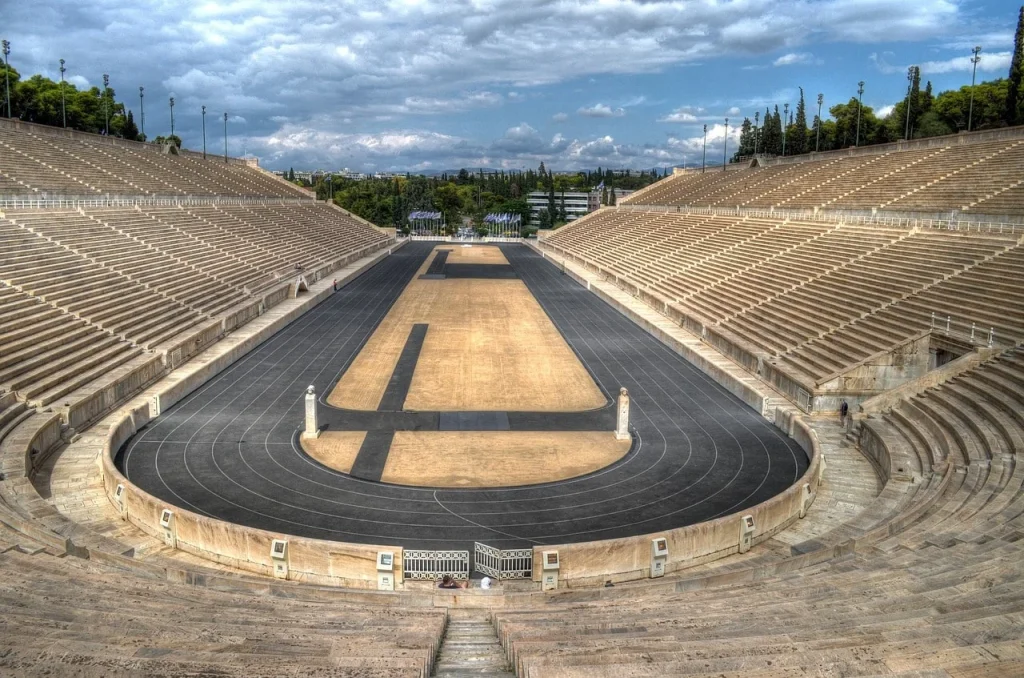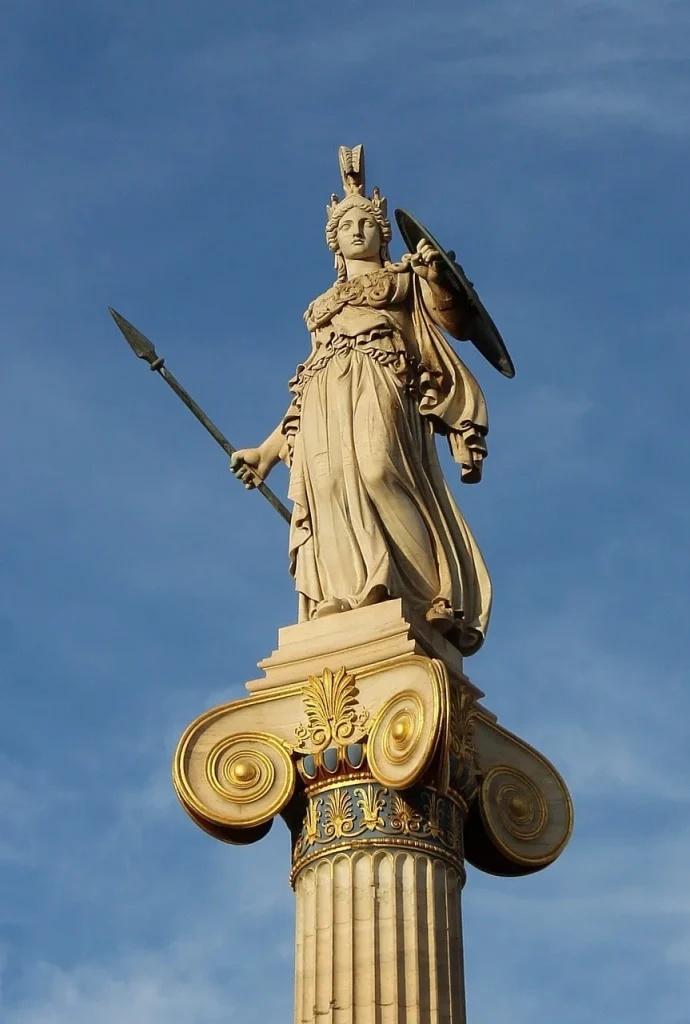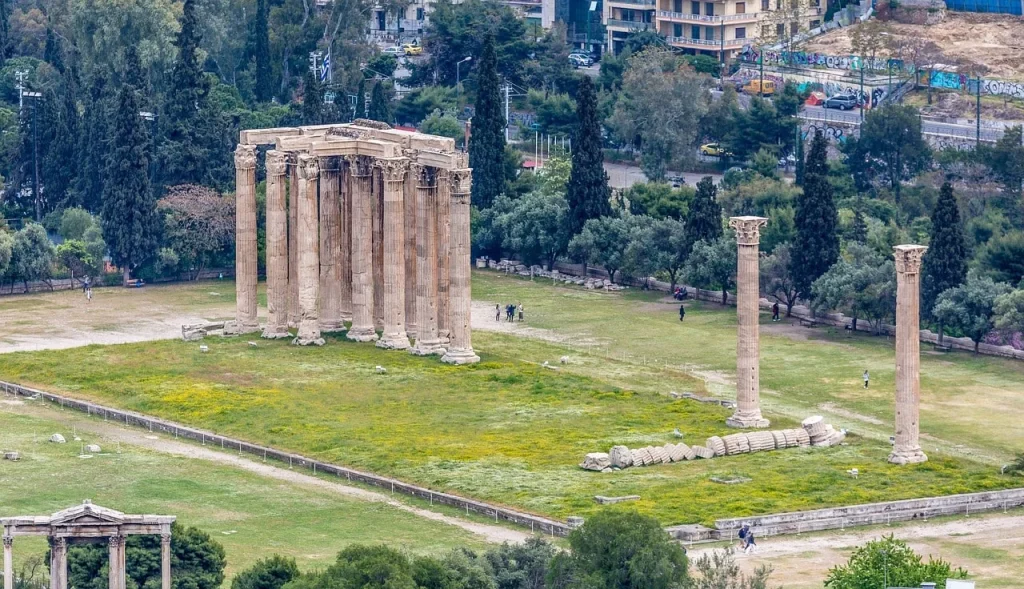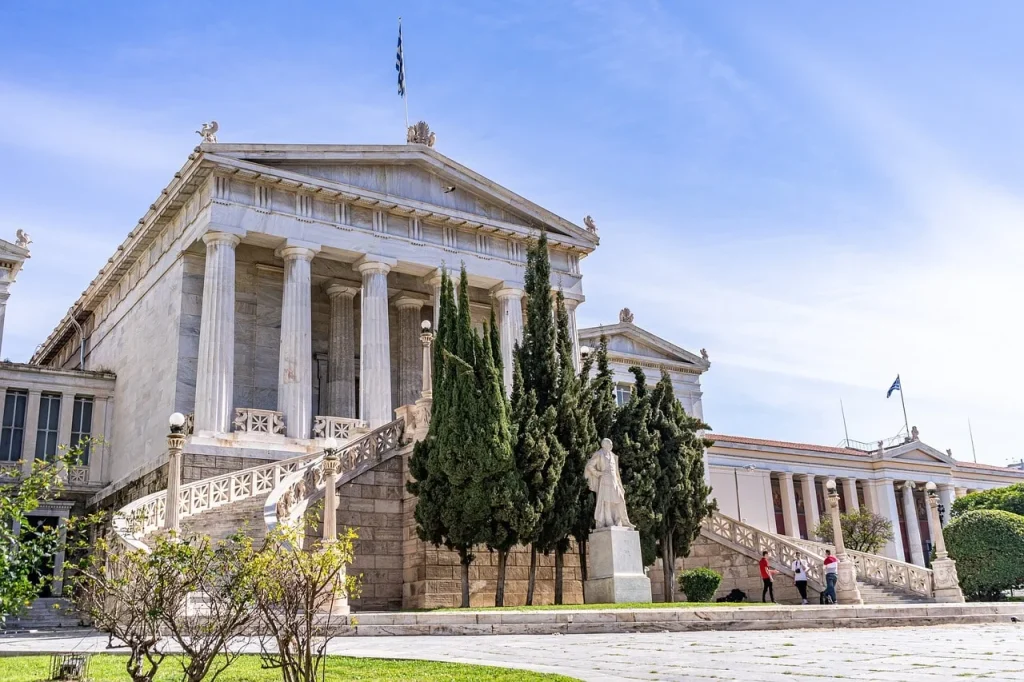Step into the world of Athens, a city where history and modernity blend seamlessly. As you stroll through its bustling markets or gaze at the majestic Parthenon, you’re walking in the footsteps of philosophers, warriors, and artists who shaped the Western world.
This page will take you on a journey through some interesting facts about Athens, each revealing a different shade of its timeless charm.
The ancient Oracle said that I was the wisest of all the Greeks. It is because I alone, of all the Greeks, know that I know nothing.
Socrates
Athens Facts
Explore Athens, where ancient history and vibrant culture converge. Stay tuned for a quiz at the end to test your knowledge!
- The Temple of Olympian Zeus, which took nearly 700 years to complete, stands as one of the most impressive ruins with columns that are 17 meters tall.
- In the heart of the city, Mount Lycabettus rises as the highest point, offering a breathtaking panorama when viewed from its summit at sunset.
- Plaka, known for its charming streets, is the oldest continuously inhabited neighborhood in Europe.
- The National Garden, a green oasis, was once the royal garden, curated personally by Queen Amalia in the 1830s with plants from across the world.
- Anafiotika, a scenic neighborhood, features Cycladic architecture unexpectedly situated beneath the Acropolis, built by workers from the island of Anafi.
- Philopappos Hill, besides offering stunning views, is named after a Roman consul and is an important historical and recreational site.
- The first modern Olympic Games were held here in 1896 in the Panathenaic Stadium, reconstructed entirely from marble.
- The city’s Metro is not only a public transit system but also a massive archaeological museum, displaying artifacts found during its construction.
- The National Archaeological Museum houses the world’s largest collection of Greek antiquities, including the famous Mask of Agamemnon.
- The name of the city’s patron goddess was contested in mythology until Poseidon and Athena competed for the honor, with Athena’s gift of the olive tree winning favor.
- A unique Athenian law in ancient times decreed that no building should be taller than the Acropolis, a rule that influenced city planning for centuries.
- The Academy of Athens, part of Greece’s national academy, is inspired by Plato’s Academy and contributes to the global intellectual community.
- Psiri and Gazi, vibrant districts, transform at night with lively music and eclectic bars, showcasing the city’s modern cultural scene.

- The Numismatic Museum, one of the oldest public museums, is housed in a building that was once the home of Heinrich Schliemann, famed for discovering Troy.
- The ancient Agora, once a hub of political and public life, remains a key site where Socrates and Plato once walked and taught.
- Kerameikos, the ancient cemetery, is also known for its extensive archaeological discoveries that reveal insights into ancient funerary practices.
- Exarchia neighborhood is famed as a bohemian and revolutionary hub, often at the heart of artistic and political movements.
- The Daphni Monastery on the outskirts features some of the most significant Byzantine mosaics, recognized as a UNESCO World Heritage Site.
- The city’s layout reflects a blend of classical and neoclassical styles, particularly evident in the central Syntagma Square.
- Odeon of Herodes Atticus, still used for performances, showcases the enduring legacy of Greek architectural acoustics.
- Eleftherios Venizelos, regarded as the greatest modern Greek statesman, influenced major developments in early 20th-century Athens.
- Athens is home to more theatrical stages per capita than any other city in the world, reflecting its residents’ ongoing passion for the performing arts.
- The Benaki Museum, through its extensive collections, chronicles Greek history from antiquity to the present.
- Melina Mercouri, an actress and later culture minister, was instrumental in the campaign to return the Parthenon Marbles from the British Museum.
- The city was once designed as a compact fortress, with all residents living within a walking distance from the city center for safety against invasions.
- Technopolis, an industrial museum and cultural venue, was once a gasworks facility and now hosts some of the city’s prime cultural events.
- Lake Vouliagmeni, on the city outskirts, is a natural thermal spa reputed for its healing properties and unique ecological environment.
- Stavros Niarchos Foundation Cultural Center is a modern architectural marvel, housing the National Library and Opera.

- During World War II, the city’s residents built extensive networks of secret tunnels and hideouts beneath their homes and public buildings.
- The annual Athens Festival attracts global talent in music, dance, and theater, utilizing historic venues such as the Odeon of Herodes Atticus.
- In ancient times, the Long Walls of Athens stretched for kilometers to connect the city with its ports, ensuring supply lines during sieges.
- The city’s love for coffee is evident in its countless traditional coffee houses and modern cafés, often filled with locals engaging in spirited conversations.
- Athens’ first university, the National and Kapodistrian University, was established in 1837, making it one of the oldest higher education institutions in the Eastern Mediterranean.
- The Athens Trilogy by Kostas Tachtsis, a monumental literary work, offers an in-depth portrayal of Athenian life in the mid-20th century.
- The Lighthouse of Saint George at the top of Mount Lycabettus was built in the 19th century and still stands as a picturesque attraction.
- Monastiraki Flea Market, active since the 18th century, continues to be a bustling hub where vintage and contemporary items converge.
- The tradition of shadow theater, deeply rooted in local culture, features Karagiozis as a beloved folk hero whose stories are told in neighborhood squares.
- Greeks celebrate “Clean Monday” by flying kites from the city’s hills, marking the start of Lent with a colorful spectacle.

- Byzantine churches, often tucked away in small corners of the city, reveal intricate designs and centuries of religious history and art.
- The city’s stray cats are an integral part of the local charm, often found sunning themselves in ancient ruins or napping in shady tavernas.
- Before becoming the city it is today, the area was inhabited since the Neolithic age, making it one of Europe’s oldest cities.
- During the 2004 Olympics, the city underwent a massive transformation, improving infrastructure and restoring historical sites.
- The Gennadius Library, an important research institution, holds a vast collection of books and manuscripts, including rare first editions.
- The Glass Runner, an annual event, challenges participants to navigate the historical streets wearing footwear made of recycled glass.
- The Athens Riviera, stretching along the coast, offers a slice of Mediterranean lifestyle with its beaches, marinas, and upscale restaurants.
- Athens’ urban art scene, particularly street graffiti, is among the most vibrant in Europe, often featured in international art publications.
- The Piraeus Lion, once a proud symbol at the port of Piraeus, is a monumental statue believed to date back to the 1st century AD.
- Each year, the city commemorates the historic Athens Polytechnic uprising of 1973, a student-led protest against the military dictatorship, with a solemn ceremony.
- Atop the Acropolis, the Erechtheion is notable for its Caryatids — statues of women serving as architectural supports instead of the typical columns.
- The municipality often hosts open-air cinemas throughout the summer, where classic Greek and international films are shown under the stars in historic settings.
Athens Myths

We’ve covered facts about Athens; now let’s tackle the myths. It’s time to separate truth from fiction.
- Athens is Constantly Crowded with Tourists
While it attracts many visitors, especially in areas like the Acropolis, it’s not always crowded. Many neighborhoods outside the tourist hotspots, such as Kypseli and Petralona, offer a quieter, more authentic experience of the city. - Greek Food in Athens is Mainly Gyros and Souvlaki
It boasts a rich culinary scene that goes far beyond gyros and souvlaki. From seafood tavernas by the sea to upscale restaurants offering modern Greek cuisine, the city caters to a wide palette. - Athens Is Unsafe
Like any major city, Athens has areas that are less safe than others, but overall, it is a relatively safe city for tourists and residents alike. Common sense and standard precautions are usually enough to ensure safety. - It’s Always Hot in Athens
Athens experiences a Mediterranean climate, which means hot, dry summers and mild, wet winters. The city enjoys pleasant temperatures in spring and autumn, making these ideal times to visit. - The Only Historic Site in Athens is the Acropolis
Athens is rich in history beyond the Acropolis. Important historical sites include the Ancient Agora, Kerameikos Cemetery, and the Temple of Olympian Zeus, each telling part of the city’s extensive ancient story.
Athens Quotes

Let’s continue with some of my favorite quotes about Athens. Feel free to share more in the comments and I’ll happily add them to the list.
Athens, the eye of Greece, mother of arts and eloquence.
John Milton
John Milton, an English poet, praised Athens in this line for its seminal contributions to art and speech, celebrating the city as a pivotal cultural and intellectual center of ancient Greece.
In all things that you do, consider the end.
Solon
Solon, one of Athens’ famed seven sages and a noted legislator, encapsulated the practical and foresighted spirit of Athenian law and philosophy with this advice, urging thoughtfulness and consideration in all actions.
When you go to Athens, will you not look for a stone of Socrates?
Michel de Montaigne
Michel de Montaigne, a French Renaissance philosopher, remarked on the deep historical and philosophical imprint left by Socrates in Athens, highlighting the city’s enduring connection to its philosophical heritage.
A great city, whose image dwells in the memory of man, is the type of some great idea. Rome represents conquest; Faith hovers over the towers of Jerusalem; and Athens embodies the pre-eminent quality of the antique world, Art.
Benjamin Disraeli
Benjamin Disraeli, a British statesman and novelist, depicted Athens as a symbol of art, echoing its significance as a beacon of aesthetic excellence and creative expression that dominated ancient times.
Athens, the light of Greece, first in the race that leads to the culture of our kind.
Percy Bysshe Shelley
Percy Bysshe Shelley, an English Romantic poet, lauded Athens for its leadership in shaping Western culture, recognizing its pivotal role in the development of democratic and artistic principles.
Athens FAQ

As we wrap up our exploration of Athens with these quotes, we approach the final segment before the quiz. Please read the following FAQs carefully to if you want to get a perfect score.
- What is Athens known for?
Athens is celebrated as the cradle of Western civilization and the birthplace of democracy. The city is renowned for its ancient monuments and artworks, notably the Acropolis, a hilltop citadel topped with historic buildings like the Parthenon. - What is the best time to visit Athens?
The best time to visit Athens is during spring (April to early June) or autumn (September to October). These months offer pleasant weather and fewer crowds compared to the peak summer season. - What is traditional Greek food one should try in Athens?
You should try dishes like moussaka (eggplant and meat casserole), souvlaki (grilled meat skewers), tzatziki (yogurt and cucumber dip), and a traditional Greek salad. - What are some good day trips from Athens?
Popular day trips include visiting the ancient site of Delphi, exploring the monasteries of Meteora, and enjoying the beaches and temple of Poseidon at Cape Sounion. - Is Athens a safe city for tourists?
It is generally safe for tourists, but like any major city, it’s advisable to stay vigilant in crowded places and take standard precautions to guard against pickpocketing, especially in tourist-heavy areas.
Athens Trivia

Welcome to the ultimate Athens quiz! If you don’t get any questions right, beware—you might find yourself lost in the labyrinth of Minotaur’s myths, with no Theseus to save you.
Conclusion
Finally, Athens teaches us the importance of preserving history while embracing progress. This city, rich with legends and architectural marvels, invites visitors to delve into its glorious past and partake in its dynamic present.
Athens is a city where every corner has a story, every street an epic, and every sunset a painting. It’s a place where history is not just studied; it’s experienced. Till next time, stay curious and explore more. Cheers.


